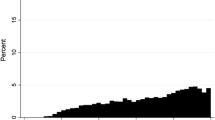Abstract
Objectives
To assess the applicability of the newly developed ICECAP-O capability index in the measurement and valuation of quality of life in a large community based sample of the Australian general population. With origins in Sen’s capability theory, the ICECAP-O may more fully encapsulate the multi-dimensional outcomes of public health policies and interventions than traditional health economic constructs.
Methods
2,937 Australian residents participated in face-to-face interviews. The relationships between ICECAP-O scores according to age groups (<65 or >65 years) and socio-economic status were investigated using descriptive statistics and multivariable linear regression models.
Results
Lower income levels and being unemployed or physically unable to work were negatively associated with capability for both age groups. Capability was strongly and positively associated with marriage and cohabitation in the younger age group, whilst being Australian-born was a positive indicator for the older group.
Conclusions
The results provide insights into the assessment of capability in the Australian general population. The ICECAP-O shows promise for application in the measurement and valuation of quality of life in general population surveys, and incorporation into economic evaluations of public health interventions.


Similar content being viewed by others
References
Brown J, Bowling A, Flynn T (2004) Models of quality of life: a taxonomy, overview and systematic review of the literature. European Forum on Population Ageing Research. Cited 13 April 2011. Available from http://www.shef.ac.uk/ageingresearch/pdf/qol_review_no_tables.pdf
Coast J (2011) In: 2nd ICECAP Users’ workshop: introduction. University of Birmingham, February 2011
Coast J, Peters TJ, Natarajan L, Sproston K, Flynn T (2008a) An assessment of the construct validity of the descriptive system for the ICECAP capability measure for older people. Qual Life Res 17:967–976
Coast J, Flynn TN, Natarajan L, Sproston K, Lewis J, Louviere J, Peters TJ (2008b) Valuing the ICECAP capability index for older people. Soc Sci Med 67:874–882
Flynn T, Louviere J, Huynh E, Terlich F (2010a) What are Australian preferences for quality of life? Results from best-worst scaling studies to value the ICECAP instruments. Paper presented at the Australian Health Economics Society meeting, Sydney, Australia, 30 Sept–1 Oct 2010
Flynn TN, Louviere J, Peters TJ, Coast J (2010b) Using discrete choice experiments to understand preferences for quality of life. Variance-scale heterogeneity matters. Soc Sci Med 70:1957–1965
Flynn T (2011) Assessing quality of life among British older people using the ICEPOP CAPability (ICECAP-O) measure. Appl Health Econ Health Policy 9:317–329
Flynn TN, Peters TJ, Coast J (2011) Workshop: quantifying response shift or adaptation effects in quality of life by synthesising BWS case 2 and discrete choice data. In: International choice modelling conference, Leeds, UK, June 2011
Grewal I, Lewis J, Flynn T, Brown J, Bond J, Coast J (2006) Developing attributes for a generic quality of life measure for older people: preferences or capabilities? Soc Sci Med 62:1891–1901
Harrison Research (2010) Health Omnibus Survey. Cited 13 April 2011. Available from http://www.harrisonresearch.com.au/health_omnibus.php.
Kurth BM, Ellert U (2002) The SF-36 questionnaire and its usefulness in population studies: results of the German Health Interview and Examination Survey 1988. Soz Präventivmed 47:266–277
Lorgelly P, Lawson KD, Fenwick EAL, Briggs AH (2010) Outcome measurement in economic evaluations of public health interventions: a role for the capability approach? Int J Environ Res Public Health 7:2274–2289
Pink B (2006a) Information Paper: an introduction to Socio-Economic Indexes For Areas (SEIFA). Australian Bureau of Statistics, Cat no. 2039.0. Canberra, Australia
Pink B (2006b) Socio-Economic Indexes for Areas (SEIFA)—technical paper. Australian Bureau of Statistics, Cat no 2039.0.55.001. Canberra, Australia
Ravens-Sieberer U (2002) Measuring and monitoring quality-of-life in population surveys: still a challenge for public health research. Soz Präventivmed 46:201–204
Robeyns I (2003) Sen’s capability approach and gender inequality. Selecting relevant capabilities. Fem Econ 9:61–92
Rowen D, Brazier J, van Hout B (2011) A comparison of methods for converting DCE values onto the full health-dead QALY scale. Health Economics and Decision Science Discussion Paper. University of Sheffield. Available from http://www.shef.ac.uk/polopoly_fs/1.165495!/file/1115.pdf
Sen A (1993) Capability and well-being. In: Nussbaum M, Sen A (eds) The quality of life. Oxford University Press, New York
Acknowledgments
The authors would like to thank Dr Paula Lorgelly for providing feedback on an earlier version of this paper. We would also like to acknowledge the financial support provided for this study by the National Health and Medical Research Council and Flinders University via a Health Services Research Strategic Award Grant (402791) and research scholarship respectively.
Author information
Authors and Affiliations
Corresponding author
Rights and permissions
About this article
Cite this article
Couzner, L., Ratcliffe, J., Lester, L. et al. Measuring and valuing quality of life for public health research: application of the ICECAP-O capability index in the Australian general population. Int J Public Health 58, 367–376 (2013). https://doi.org/10.1007/s00038-012-0407-4
Received:
Revised:
Accepted:
Published:
Issue Date:
DOI: https://doi.org/10.1007/s00038-012-0407-4




